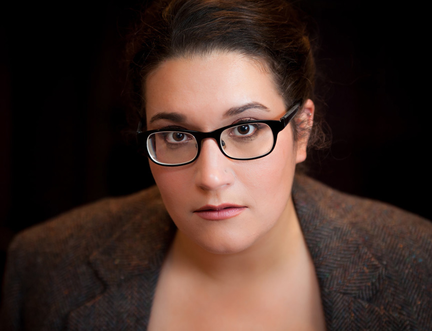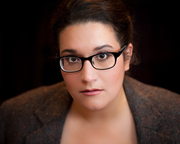Total Freedom
By Carmen Maria Machado

In 2018, we commissioned 51 authors from 25 countries to write essays exploring ideas about freedom for The Freedom Papers, a publication produced in partnership with Gutter Magazine. Read on for Carmen Maria Machado's essay, and visit guttermag.co.uk to purchase a copy of The Freedom Papers.
In Borges’ 1939 essay 'The Total Library', which later served as the basis for his short story 'The Library of Babel', he imagined a library of infinite books, created of every conceivable arrangement of a certain kind of universal alphabet. Being infinite, he imagined, everything would be there:
“… the detailed history of the future, Aeschylus' The Egyptians, the exact number of times that the waters of the Ganges have reflected the flight of a falcon, the secret and true name of Rome, the encyclopedia Navalis would have constructed, my dreams and half-dreams at dawn on August 14, 1934, the proof of Pierre Fermat's theorem, the unwritten chapters of Edwin Drood, those same chapters translated into the language spoken by the Garamantes, the paradoxes Berkeley invented concerning Time but didn't publish, Urizen's books of iron, the premature epiphanies of Stephen Dedalus, which would be meaningless before a cycle of a thousand years, the Gnostic Gospel of Basilides, the song the sirens sang, the complete catalog of the Library, the proof of the inaccuracy of that catalog…”
But alongside all of this would be loads of “millions of meaningless cacophonies, verbal farragoes, and babblings,” where the potentiality of language extends beyond meaning. After all, mere existence does not equal pleasure or wisdom or function; it equals the fulfillment of possibility, full stop.
*
Every American child learns and deploys a particular phrase in their youths: “It’s a free country!” You hear them trying the phrase out in their mouths, rolling it against their palate, testing its surface, its shape. It is shouted at babysitters, friends, siblings, teachers. It is, for a beat, innocuous—so seemingly simple—but run your fingernail light over the surface and the whole thing erupts with densely-packed chaos: a victory cry and a threat in the same breath.
It is an expression of newly-discovered independence, of vague, misunderstood patriotism. It’s the rush of pure, uncut privilege and hubris, when you learn that you live in a country where your freedom (here, you hear the word “you” with astounding clarity; me? you mouth, finger tapping your own breastbone) has been bought and paid for by centuries of blood; your freedom is a foregone conclusion. Never mind that the men who gave it to you literally owned the freedom of other human beings. It’s a free country, and I am free.
I yelled it once at my mother when she told me I was not allowed to have the transparent telephone I’d won as the top cookie seller in my Girl Scout Troop. (Injustice; I’d earned it.) I yelled it at my brother when he told me he wanted a certain slice of luncheon meat that I also wanted. (Possession; I’d gotten to it first.) I yelled it at an ex-boyfriend when I decided to stop shaving my pubic hair against his wishes. (Autonomy; my body was mine.)
I did not yell it at my parents when they found out I’d spit on a friend’s little brother on a playground. We’d been in a spitting match, I tried to explain, but when my father told me in a calm, serious voice that spitting on someone was one of the worst things you could do to a person, that it was an expression of sheer contempt and bigotry, I was so ashamed I burst into tears. Once I stopped crying, they made me put on a nice dress and go over to my friend’s family’s house and apologize for what I’d done. At every step, they waited for a fight, but none came. I knew that my freedom was not, in that moment, relevant. This was possibly as much of a revelation as its inverse, and maybe even more so.
Many people suffer from the idea that their ability to do or say whatever they want is somehow relevant to the larger discourse. Here, imagine such a person pulling a book of gibberish off the shelf of the Total Library and lobbying us that the fact this it exists gives it value. The response is that same as to the child: So what? So what if this book is possible and therefore exists? So what if you’re free? What are you going to do about it?
*
“The Total Library” opens thusly: “The fancy or the imagination or the utopia of the Total Library has certain characteristics that are easily confused with virtues.” It’s easy to feel free when nothing means anything. Negotiating freedom in the world is much trickier than the limitless expanse of its abstraction.
You are free to do and say what you wish, but not free to restrict the freedom of others. You are free to do and say what you wish, but you must bear the consequences. You are free to do and say what you wish, but you must live with yourself afterwards. You are free to do and say what you wish, but other people will try to restrict your freedom. You are free to do and say what you wish, but everyone does not see it that way. You are free to do and say what you wish, but you have fought for that freedom before and you will fight for it again. You are free to do and say what you wish, and live until you die. But before that, the question is not, how free are you? Rather: Who are you, with freedom on your side?
Copyright © 2018, Carmen Maria Machado. All rights reserved.
Supported by the Scottish Government’s Edinburgh Festivals Expo Fund through Creative Scotland.


 Major new partnership with Celtic Connections
Major new partnership with Celtic Connections 

